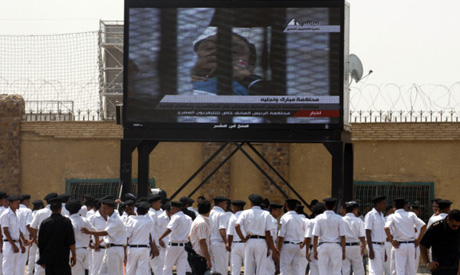
Egyptian police officers watch toppled president Hosni Mubarak on a bed in the defendants' cage from the courtroom live on a large TV screen outside the Police Military Academy complex in Cairo (Photo: AP)
The case against ousted president Hosni Mubarak and former interior minister Habib El-Adly for killing protesters during the 18-day uprising were today merged. The decision prompted a round of applause by the end of the second session in the case against Mubarak and his sons, Alaa and Gamal.
Merging both trials was a key request by lawyers for the victims as Mubarak, El-Adly and six of the latter’s assistants are all accused of instigating the killing of peaceful protester in the first days of the January 25 Revolution.
Mubarak was originally set to be tried separately from the rest of the defendants indicted on the same charge before the cases against the eight were merged a few days ahead of the opening session of the trial, on 3 August.
Following that session, Mubarak’s case was separated, upon the request of his lead defence lawyer, Fareed El-Dib.
Merging the cases is believed to bolster the chances of convicting Mubarak for murder.
The trial has been adjourned to 5 September with El-Adly’s trial.
The case against the ousted president, his two sons and fugitive businessman Hussien Salem, being tried in absentia, for illegal profiteering and exporting Egyptian natural gas to Israel at below the market price will still be heard.
On the other hand, Judge Ahmed Refaat announced that the court sessions will no longer be televised. The first two sessions of Mubarak’s trial were aired as well as a separate one for El-Adly and his assistants yesterday.
Broadcasting the court sessions was a demand made by the public to ensure the trial’s credibility. The fact that the public can watch the ousted president stand trial was considered one of the gains of the revolution. "I can understand that the court would like to preserve the privacy of the witnesses, but why can't the speeches by both the accused defence and the lawyers of the victims be broadcasted?” asked Ahmed Ezzat, a political activist and lawyer.
However, Refaat’s decision also came in for much praise. Legal experts stressed that transparency of justice should not be negatively affected by the ban on television cameras, with the families of the martyrs and media personnel still allowed to attend the sessions.
Mubarak is currently being detained at the International Medical Centre on the Ismailiya Road.
Short link: